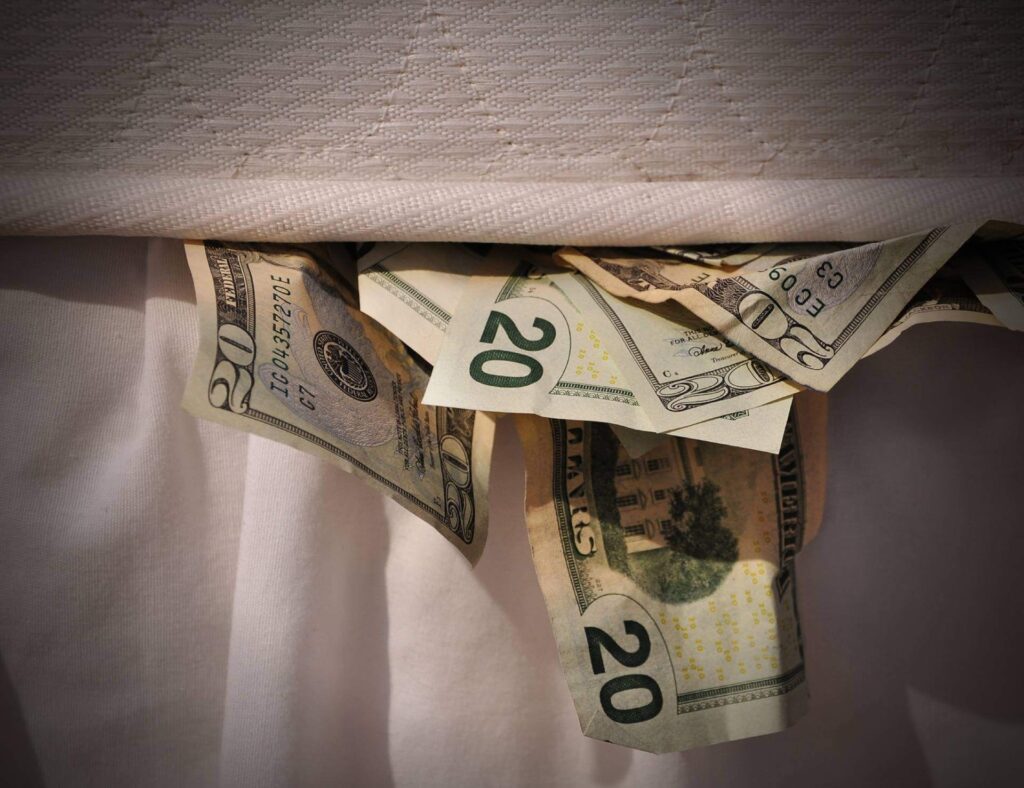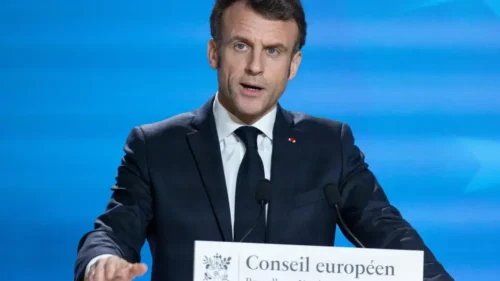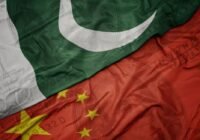There can be little doubt that everything that is happening at the intersection of financial matters and geopolitics has become marked by a growing trend towards ambiguity and instability. The events of this past June radically increased the degree of both ambiguity and instability especially for Europe, but also the rest of the world. The month ended with what is still an ongoing psychodrama in the United States, as the nation witnessed the degree of mental instability and political ambiguity of its serving president, Joe Biden, who is set to run for re-election in November. Will Biden step down? The pressure is mounting for him to pass the baton, but the Biden family, led by Dr Jill and Hunter, is valorously resisting.
Europe is in an even more dramatic bind than the US. The ambiguity surrounding Biden himself means that the likelihood of a new Trump White House has never been greater, despite Trump being a convicted felon thanks to the judgment of a criminal court that same June. Europeans are dreading the unpredictable consequences of a new Trump administration.
Even without that factor of ambiguity, Europe is immersed in its own problems. The major event of the month was the initiation of what may turn into a new French Revolution. Reacting to the disastrous showing of his coalition in the European parliamentary elections on June 9, President Emmanuel Macron, as soon as the results were announced, precipitously hatched his daring, potentially suicidal gambit. He called for new elections to “clarify” the balance of political forces in France. Already struggling to deal with the expense, uncertainty and disappointing evolution of NATO’s tragic war in Ukraine, Europe was thrown into a state of suspended animation as it awaited the outcomes of the British and French elections. Those took place in the first week of July.
On June 13, four days after Macron’s act of folly, Alex Gloy offered this “quick observation” based on the state of the global bond markets. He sees the unmistakable seeds of a European banking crisis.
“These are current 10-year government bond yields (except TYX, which is the US 30-yr). The focus here is on the difference, or spread, in yield between Germany and France. A week ago, that spread was 0.50%. It is rapidly widening, now at 0.71%. This is worrying. Why? You can purchase government bonds in the same currency but get different yields. This does not make sense unless there is a difference in default probability and / or exit from the Euro. Both of which would be catastrophic events for Europe.
Germany has fiscal deficit of 2.5% of GDP, while France is running at 5.5%. Germany has a debt-to-GDP ratio of 63.6%, while France stands at 111%.
Financial markets hate uncertainty, and the outcome of French elections is unknown, with the risk being a populist right-wing government ignoring the fiscal constraints of the Treaty of Maastricht (max 3% deficit, max 60% debt-to-GDP, both which are already being ignored).
France’s fiscal position is now worse than Spain (3.6% deficit, 108% debt-to-GDP). France should tighten its belt, but that would probably cause more social unrest.
The spread-widening in the government bond market has led to pressure on European bank stocks; BNP fell from EUR 72 to 60 and Deutsche Bank from 16.70 to 14.60. Banks usually have positions in government bonds. Another banking crisis is the last thing Europe needs now.
Still, it is worth mentioning that all Euro-members, including Greece, are currently paying less than the UK or the US.”
Related Reading
Our colleague Edward Quince offered his own reflections, provoked by another destabilizing event in the month of June: the presence of a Russian nuclear submarine off the coast of the US.
“Alex,
Mr. Putin ain’t dumb. The alarming part of his seemingly nonsensical attitude toward the USD is his informed confidence about what is to come next. Note that he almost always refers to the USD in the past tense. I’ll detail the not-so-secret weapon he has up his sleeve after I finish documenting the events surrounding the Russian nuclear submarine docking in Havana, Cuba today. The short answer, however, is ‘BRICS Bridge, blockchain, and gold derivatives.’
When I researched the work done by Russia and China since 2008 to establish a new, more equitable, and less risky finance and trade environment, BRICS emerged as the ultimate cooperation framework and platform. After having read a ton, it is apparent that a tremendous amount of very focused and deliberate work has been done since then. This 2015 Ufa Declaration describes the goals, the underlying strategy and some tactics behind the major finance and trade initiatives. The key framework there is the Contingent Reserves Arrangement. Nine years and several global crises later, Mr. Putin has told us just a tiny bit about what has been built on that foundation.
On a separate note, I’ve just finished re-reading Henry Kissinger’s ‘On China.’ The intricate political play that Kissinger orchestrated in the 70s and the 80s now looks like an elaborate short-term trap for China in the American long-term game against Russia. I can only imagine the depth of resentment and distrust towards the US in Beijing these days. Alternatively, it is possible that there has never been any such trust, and China played the long game knowing that one day the USA would inevitably turn adversarial once again. Nevertheless, since there is nobody resembling Mr. Kissinger in Washington now, there seems to be no going back to the status quo to which we all grew so accustomed.”
With the drama continuing to develop, on June 29, I offered my own testimony. I am a voter in the coming French election, and potentially the US election in November.
“As a dual citizen of two nations, each with a president clearly demonstrating suicidal behavior, I have to wonder about the continued political coherence and even institutional solidity of both. Tomorrow I will be voting in an election that in all probability will establish the contour of what promises to be twelve months of political and I expect even deeper cultural chaos. On July 8 France will most likely have a ‘hung by the rafters’ parliament and a situation of maneuvering that will take place as much on the streets as in the Assemblée Nationale.
The point of a presidential as opposed to a parliamentary regime is that at the core of government there is a human being who symbolizes the unity of the nation. Political wrangling is a permanent feature of all democracies, but there is always some kind of symbol that makes even the worst confrontations palatable. In the UK, the Netherlands, Belgium and even Spain, the monarchy plays its role in stabilizing the question of national identity. In presidential regimes, it can only be the president and the flag.
On Sunday, June 9, Emmanuel Macron miscalculated when, by announcing the dissolution the Assemblée, he effectively declared two things:
- That any pretense of political unity for the nation was compromised beyond negotiable repair;
- That the president, as a lame duck because of serving his second term, had now become a non-entity, deprived of the quasi-absolute power De Gaulle had defined for the office.
Macron hoped to address the first point but he was in denial about the reality of the second one, despite its being obvious to everyone else, including his own inner circle.
For three quarters of a century Europe has developed as a zone of relative peace and prosperity in the shadow of the US nuclear umbrella and the US dollar, despite the launch of the Euro. In the context of the war in Ukraine, it has now implicitly embraced the growth of what Dwight Eisenhower – alone among all modern presidents – had the temerity to name: the military-industrial complex.
Europeans have long worried about the role of what President Giscard d’Estaing called the “exorbitant privilege” but accepted the floating dollar as a feature of the new world order. De Gaulle led the campaign against the dollar that eventually led to Nixon’s decoupling of the dollar and gold, creating a new global landscape supported by the petrodollar and the Eurodollar. De Gaulle also dared to counter the US by withdrawing from NATO’s central command structure, with the futile aim of achieving military autonomy.
Europe is still struggling mightily with these two issues. It will be interesting to see how this year’s elections influence those developments.”
Previous episodes of Money Matters are available here:
Join the debate
Money Matters…, is dedicated to developing this discussion and involving all interested parties.
We invite all of you who have something to contribute to send us your reflections at dialogue@fairobserver.com. We will integrate your insights into the ongoing debate. We will publish them as articles or as part of the ongoing dialogue.
*[Fair Observer’s “Crucible of Collaboration” is meant to be a space in which multiple voices can be heard, comparing and contrasting their opinions and insights in the interest of deepening and broadening our understanding of complex topics.]
[Lee Thompson-Kolar edited this piece.]
The views expressed in this article are the author’s own and do not necessarily reflect Fair Observer’s editorial policy.
Support Fair Observer
We rely on your support for our independence, diversity and quality.
For more than 10 years, Fair Observer has been free, fair and independent. No billionaire owns us, no advertisers control us. We are a reader-supported nonprofit. Unlike many other publications, we keep our content free for readers regardless of where they live or whether they can afford to pay. We have no paywalls and no ads.
In the post-truth era of fake news, echo chambers and filter bubbles, we publish a plurality of perspectives from around the world. Anyone can publish with us, but everyone goes through a rigorous editorial process. So, you get fact-checked, well-reasoned content instead of noise.
We publish 3,000+ voices from 90+ countries. We also conduct education and training programs
on subjects ranging from digital media and journalism to writing and critical thinking. This
doesn’t come cheap. Servers, editors, trainers and web developers cost
money.
Please consider supporting us on a regular basis as a recurring donor or a
sustaining member.
Will you support FO’s journalism?
We rely on your support for our independence, diversity and quality.












Comment